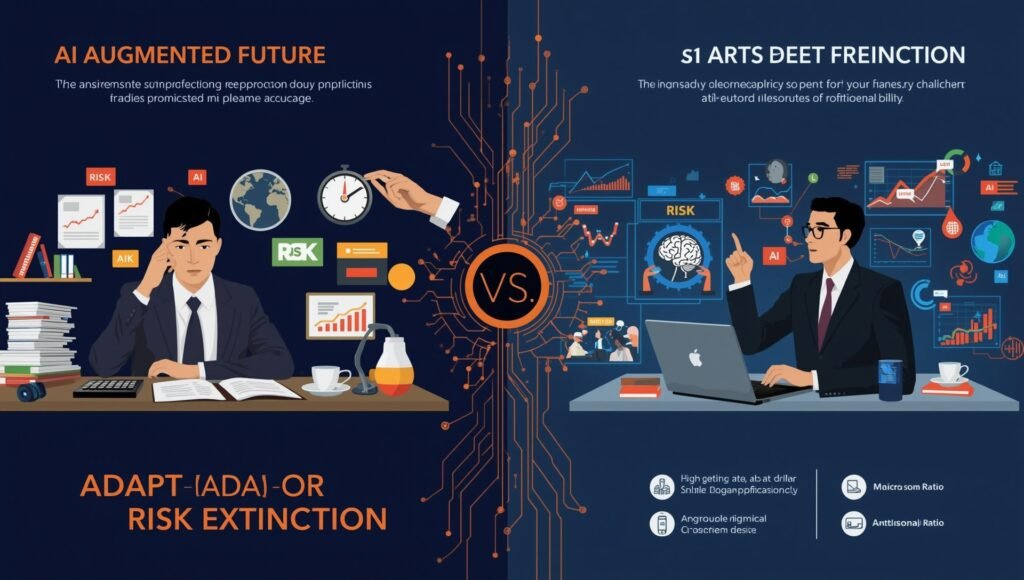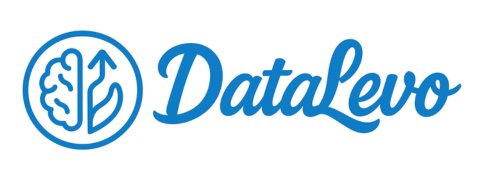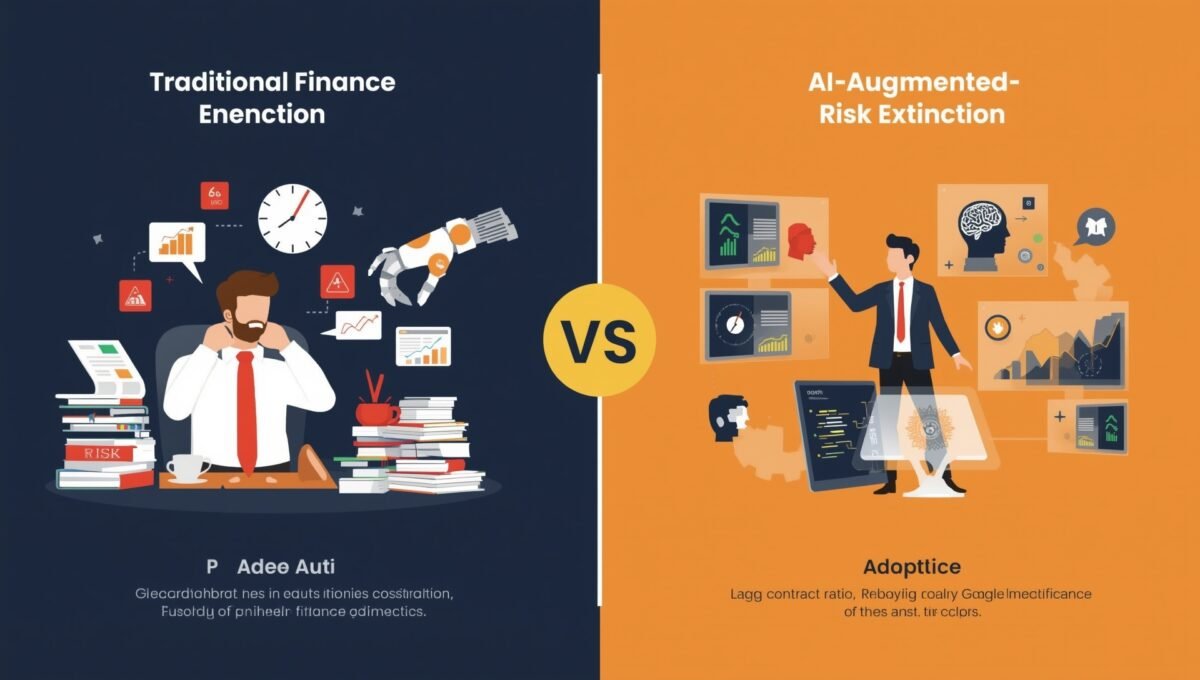Finance professionals worldwide face unprecedented uncertainty as artificial intelligence reshapes their industry. Recent headlines about AI replacing human workers create genuine anxiety about job security. Many question whether their years of experience and education still matter in an automated world.
The truth about whether finance jobs are at risk from AI isn’t black and white. While certain roles face automation threats, others remain fundamentally human-centric. Understanding which positions are vulnerable, which are safe, and how to adapt determines your career survival. This comprehensive analysis reveals the realistic impact of AI on finance careers, backed by industry research and expert predictions for strategic career planning.
Current State of AI in Finance Industry
Artificial intelligence already transforms financial services at unprecedented speed. Major institutions invest billions in automation technologies that streamline operations and reduce costs. The finance sector AI threat isn’t theoretical anymore – it’s happening right now.
AI Tasks Currently Automated in Finance:
• Document processing and data extraction • Basic financial analysis and reporting • Fraud detection and risk assessment • Customer service chatbots and support • Trade execution and portfolio rebalancing • Regulatory compliance monitoring
JPMorgan’s COIN program processes legal documents that previously required 360,000 hours of lawyer time annually. The system completes this work in seconds with higher accuracy rates. Goldman Sachs reduced its trading floor staff from 600 to just two traders through algorithmic automation.
Investment in Financial AI Technology:
The global AI in finance market reached $44.06 billion in 2024. McKinsey research shows financial services leads all industries in AI adoption rates. Banks report 15-20% cost reductions through automation implementation. Source: McKinsey research
Citibank’s comprehensive study reveals alarming statistics about automation potential. The research examined thousands of finance roles across different sectors and experience levels. Results show significant variations in automation risk based on job functions and required skills.
Major financial institutions continue expanding their AI capabilities. Bank of America’s Erica chatbot handles over 100 million customer interactions annually. BlackRock uses Aladdin risk management system to oversee $21 trillion in assets globally.
Finance Jobs Most Vulnerable to AI Disruption
Understanding which finance jobs are at risk from AI helps professionals make informed career decisions. Entry level finance jobs at risk face the highest automation probability due to repetitive task structures.
High-Risk Finance Positions:
Data Entry and Processing Roles show 95% automation probability. These positions involve routine data input, document scanning, and basic calculations. AI systems process information faster and more accurately than human workers.
Basic Financial Analysis Positions face 47% automation risk according to Oxford University research. Junior analysts performing standard ratio calculations, trend analysis, and report generation become easily replaceable. Machine learning models identify patterns and generate insights automatically.
Customer Service Representatives in banking experience 67% automation likelihood. Chatbots handle common inquiries, account questions, and transaction requests. Natural language processing improves continuously, reducing human intervention needs.
Accounts Payable/Receivable Clerks encounter 84% replacement probability. Optical character recognition software processes invoices automatically. Payment systems integrate directly with accounting platforms, eliminating manual intervention requirements.
Timeline for Automation by Job Type:
• Immediate (2025-2026): Data entry, basic bookkeeping, simple customer service • Short-term (2027-2029): Junior analyst roles, compliance monitoring, credit processing
• Medium-term (2030-2035): Mid-level analysis, relationship management, specialized reporting
Geographic variations affect implementation speed. Silicon Valley and New York lead adoption, while smaller markets lag behind. Regulatory environments also influence automation timelines across different countries.
The accounting jobs automation trend accelerates rapidly. Will accounting jobs be replaced by AI becomes increasingly relevant as software handles tax preparation, bookkeeping, and basic auditing functions automatically.
Are Finance Jobs at Risk from AI

The question “are finance jobs at risk from AI” requires nuanced examination beyond simple yes/no answers. While automation threatens certain positions, many finance careers remain secure or even benefit from AI integration.
Jobs AI Cannot Replace:
Strategic Financial Planning requires human judgment for complex business decisions. Senior finance leaders interpret market conditions, assess competitive landscapes, and make nuanced recommendations. Emotional intelligence and stakeholder management remain exclusively human capabilities.
Client Relationship Management in wealth management and advisory services stays human-centric. High-net-worth clients demand personal relationships, trust-building, and customized service. AI provides analysis support but cannot replace human connection and empathy.
Complex Problem-Solving in areas like mergers, acquisitions, and restructuring needs creative thinking. These situations involve unique circumstances, negotiation skills, and strategic insight. Machine learning handles patterns but struggles with unprecedented scenarios.
Regulatory Compliance Leadership requires interpretation of evolving rules and ethical judgment. While AI assists with monitoring, human oversight ensures proper implementation and handles gray areas. Regulatory bodies often require human accountability for compliance decisions.
Positions That Will Evolve Rather Than Disappear:
Financial analysts won’t disappear but their roles transform significantly. Instead of spending hours on data collection, they focus on interpretation and strategic recommendations. AI finance jobs emerge combining traditional finance knowledge with technology skills.
Risk managers gain powerful tools for scenario modeling and stress testing. Human expertise guides AI analysis while automated systems process vast datasets. The collaboration enhances risk assessment capabilities beyond either human or machine working alone.
New Career Opportunities Created by AI:
• AI Finance Specialists bridge technology and finance domains • Data Scientists specializing in financial modeling and analysis
• AI Ethics Officers ensuring responsible AI implementation • Process Optimization Managers designing human-AI workflows • Financial Technology Consultants helping firms implement AI solutions
Finance Sectors With Different Risk Levels
Various finance sectors face different levels of AI disruption. Understanding sector-specific impacts helps professionals choose resilient career paths.
Investment Banking experiences selective automation. Junior analysts performing pitch book preparation and data compilation face high replacement risk. However, client relationships, deal structuring, and negotiation remain human-dominated. Investment banking AI automation focuses on supporting rather than replacing senior professionals.
Retail Banking sees extensive customer-facing automation. Branch tellers and basic customer service roles decline rapidly. Personal banking relationships and complex problem resolution maintain human requirements. Wealth management services remain relationship-driven despite AI analytical support.
Insurance and Risk Assessment undergoes significant transformation. Insurance jobs at risk from AI include claims processing, underwriting junior positions, and basic actuarial work. However, complex risk evaluation, customer relationship management, and specialized product development require human expertise.
Financial Planning and Advisory Services show resilience against automation. Financial planning jobs safe from AI include comprehensive wealth planning, estate planning, and tax strategy development. Clients seek human advisors for life-changing financial decisions requiring empathy and personal guidance.
Accounting and Auditing Transformation varies by specialization. Basic bookkeeping and tax preparation face automation, while audit jobs replaced by AI target routine compliance checking. Forensic accounting, complex audit interpretation, and advisory services remain human-centric.
How Finance Professionals Can Adapt and Thrive
Finance career AI adaptation requires proactive skill development and strategic positioning. Professionals who embrace change position themselves for success in the evolving landscape.
Essential Skills for AI-Augmented Finance:
Technology Literacy becomes fundamental for all finance roles. Understanding how AI tools work, their limitations, and optimal applications separates successful professionals from those left behind. Finance professionals AI skills include basic programming, data analysis, and AI tool utilization.
Data Interpretation skills gain premium value as AI generates massive analytical outputs. Humans must interpret results, identify anomalies, and translate insights into business recommendations. Statistical knowledge and critical thinking become essential competencies.
Strategic Thinking differentiates human value in automated environments. While AI handles routine analysis, humans provide context, consider market dynamics, and make judgment calls. Complex reasoning and scenario planning remain uniquely human capabilities.
Communication and Presentation skills become more critical as finance professionals must explain AI-generated insights to non-technical stakeholders. Storytelling with data and translating complex analysis into actionable recommendations create career differentiation.
Certification and Training Programs:
CFA Institute introduces AI and big data modules in their curriculum. The program helps investment professionals understand AI applications in portfolio management and analysis.
Financial Risk Manager (FRM) certification expands coverage of AI risk assessment tools. Risk managers learn to implement and oversee automated risk monitoring systems.
Certified Public Accountant (CPA) programs add technology and data analytics requirements. Accounting professionals must demonstrate AI tool proficiency and understand automation implications.
Building AI Collaboration Capabilities:
Successful finance professionals learn to work alongside AI systems rather than compete against them. They understand AI strengths like pattern recognition and speed while leveraging human strengths like creativity and judgment.
Reskilling finance professionals requires continuous learning mindsets. Industry changes accelerate, making ongoing education essential for career survival. Professional development budgets should prioritize AI-related training and certification programs.
Expert Predictions and Industry Forecasts
Leading research organizations provide insights into finance employment futures. Their findings help professionals understand realistic timelines and adaptation strategies.
McKinsey Global Institute Research predicts 30% of finance tasks could be automated by 2030. However, they emphasize job transformation rather than elimination. Finance jobs AI statistics 2025 show growing demand for AI-augmented roles.
Deloitte Finance AI Research identifies three waves of automation impact. First wave targets routine tasks, second wave affects analysis functions, and third wave influences decision-making processes. Each wave creates adaptation opportunities for prepared professionals.
Oxford University Finance Automation studies show highest risk in junior positions with repetitive tasks. Senior roles requiring creativity, relationship management, and strategic thinking maintain low automation probability.
World Economic Forum predicts finance sector will create 2.4 million new jobs by 2030 despite automation. New positions focus on human-AI collaboration, ethical AI governance, and complex problem-solving requiring human insight.
Regional Differences in AI Implementation:
North American financial centers lead adoption with aggressive automation timelines. European markets show more cautious implementation due to regulatory considerations. Asian financial hubs vary significantly by country, with Singapore and Hong Kong advancing rapidly while others lag behind.
Success Stories: Finance Professionals Embracing AI
Real-world examples demonstrate successful career transitions in the AI-augmented finance landscape. These stories provide practical guidance for adaptation strategies.
Case Study: Junior Analyst to AI Strategy Manager
Sarah Chen started as a junior financial analyst at a regional bank. When automation threatened her role, she pursued data science certification and learned Python programming. She now leads the bank’s AI implementation team, earning 40% more than her previous analyst position.
Case Study: Traditional Auditor to Forensic AI Specialist
Michael Rodriguez transitioned from standard audit work to forensic accounting with AI specialization. He helps companies investigate financial fraud using machine learning tools. His unique skill combination commands premium consulting rates.
Companies Supporting Employee Reskilling:
JPMorgan Chase invests $350 million annually in employee training programs. Their initiatives help staff transition to AI-augmented roles rather than face unemployment. The bank reports 85% success rates in internal career transitions.
Goldman Sachs created internal AI academies for employees. The programs teach existing staff to work with automated systems and develop new AI-related capabilities. Participants receive priority consideration for emerging technology roles.
Salary Impact of AI Skills Integration:
Finance professionals with AI skills command 25-35% salary premiums compared to traditional roles. The skill shortage in AI-augmented finance creates competitive advantages for prepared professionals. Jobs safe from AI often require hybrid skill sets combining finance expertise with technology capabilities.
Conclusion
The question “are finance jobs at risk from AI” has a complex answer requiring careful consideration of role types, skill levels, and adaptation strategies. While entry-level and routine positions face significant automation threats, strategic roles and human-centric functions remain secure and often benefit from AI augmentation.
Professional survival depends on understanding which finance jobs are most vulnerable and taking proactive steps to develop complementary skills. The finance professionals who thrive in the AI era combine traditional expertise with technology literacy, strategic thinking, and continuous learning mindsets.
Rather than viewing AI as a threat, successful finance careers emerge from embracing human-AI collaboration. The future belongs to professionals who leverage artificial intelligence as a powerful tool while providing uniquely human value through creativity, relationships, and complex judgment.
Your career security lies not in avoiding AI but in understanding how to work alongside it effectively. Start developing AI-adjacent skills today, focus on strategic and relationship-intensive roles, and maintain the continuous learning mindset essential for long-term success. For comprehensive career transition strategies and industry-specific guidance, explore our detailed resource library covering emerging finance career opportunities and professional development pathways.
FAQs
1. Will AI replace financial analysts completely?
No, but junior analyst roles face high automation risk. Senior analysts focusing on strategy, interpretation, and client relationships remain valuable and often see their capabilities enhanced by AI tools.
2. What finance jobs are completely safe from AI automation?
High-level strategic roles, complex client relationship management, creative problem-solving positions, and jobs requiring ethical judgment remain largely protected from automation.
3. How long do I have to prepare for AI changes in finance?
Basic automation affects entry-level roles within 2-3 years. More complex positions have 5-10 year adaptation windows. Start preparing now regardless of your current position level.
4. Should I learn programming to survive in finance?
Basic programming knowledge helps but isn’t mandatory for all roles. Focus on understanding AI capabilities, data interpretation, and strategic thinking skills that complement automated systems.
5. Are finance jobs still in demand despite AI threats?
Yes, overall finance employment continues growing. While some positions disappear, new AI-related roles emerge. The key is positioning yourself for evolving job requirements rather than disappearing ones.
6. How much should I invest in AI-related training?
Allocate 10-15% of annual income to continuous learning and certification. This investment pays dividends through career security and salary premiums in the AI-augmented job market.



